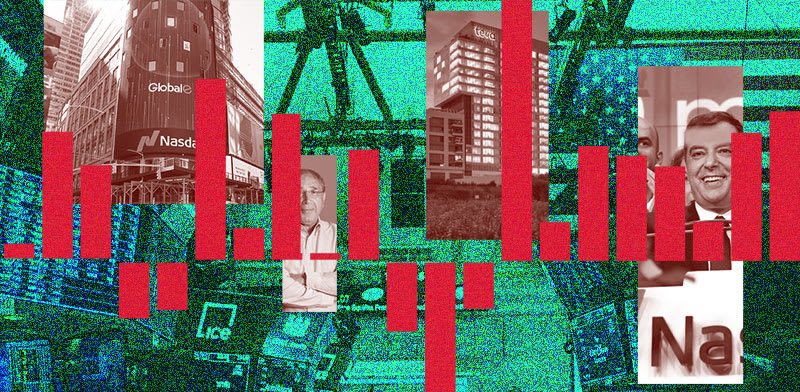
The recent turmoil on the US capital markets has radically changed the picture that emerged at the beginning of 2025, when Wall Street companies published their annual forecasts. The level of uncertainty has increased significantly, due to Trump’s tariff plan, a major part of which has been temporarily frozen, and this has been reflected in stock prices. Israeli companies on Wall Street have suffered sharp declines from their recent highs, and in many cases have seen billions wiped off their market cap in a matter of weeks. A Globes analysis has found that 10 Israeli (and Israeli-related) companies traded on US stock exchanges have each lost over $2 billion since their peak earlier this year.
For Teva Pharmaceutical Industries Ltd. (NYSE: TEVA; TASE: TEVA), this is a write-off of $9.7 billion to a current market cap of $15.76 billion. Advanced driving assistance systems (ADAS) company Mobileye Global Inc (Nasdaq: MBLY) has shed $7.7 billion from its market cap, and e-commerce company Global E (Nasdaq: GLBE) has lost $5.1 billion.
At the same time, the average price targets of analysts covering all these stocks are now, after the declines, tens of percent higher than the current market price. Ostensibly, they reflect optimism about stock prices in the coming year, although it is more likely that analysts are waiting for the upcoming financial reports and the revised forecasts before cutting price targets. The reporting season for Israeli companies officially begins next week.
The small and the risky
The Nasdaq index, which is associated with tech stocks, lost 16.1% from its peak in February, and the Russell 2000 index of small stocks weakened by 18.8% from its last peak in January. In contrast, 25 prominent Israeli companies on Wall Street (most of them in the technology sector) lost an average of about 24% from the most recent peak of 2025, with some of them – for example, Global-E, Camtek (Nasdaq: CAMT; TASE: CAMT) and ZIM Integrated Shipping Services Ltd. (NYSE: ZIM), falling by more than 40%.
Oppenheimer senior equity analyst Sergey Vastchenok explains this by risk aversion – that is, investors first “throw away” stocks with a high beta (meaning that the volatility, or risk, of a stock is high relative to the market) and the fact that they are Israeli has no effect on sentiment.
ANEK Capital cofounder and chief investment manager Orel Levy says, “The companies related to Israel are mostly SMID Cap – small and medium-sized, and in times of uncertainty, SMID shares tend to be ‘thrown away’ before others. Some of the companies were also not profitable enough, so they are ‘disposed of’ earlier.”
Another example he gives is website building platform company Wix.com Ltd. (Nasdaq: WIX), which has fallen by about 35% from its recent peak. According to Levy, companies that similarly gave forecasts of accelerated growth later this year are now facing increasing investor skepticism on their ability to speed up growth, and investors are also getting rid of such shares.
Declining multiples and prices
Levy says that during the reporting season, investors expect a reduction in forecasts, or in other words, ‘cleaning the table’ in terms of forecasts. “What is expected in the reporting season is a reduction in numbers, which will create a more favorable starting point for the rest of the year. No investor will invest in a company that may later cut forecasts. They would prefer that they get this out of the way and include the uncertainty in the forecasts. I’m not sure that investors will be angry about lower forecasts, because when the companies gave forecasts in the fourth quarter reports, everything would have looked better.”
He added, “The tariffs do not affect tech companies, but they do affect their customers. The impact has not yet occurred in the first quarter, so it is possible that it will be relatively good.”
Vastchenok points out that a possibility in which companies will give two types of forecasts. A base scenario and a recession scenario, “and then it depends on the pricing. If even in relation to the worst-case scenario the pricing is low, the stock could go up.”
In his assessment, it is also possible that some companies will remove forecasts as was the case at the beginning of the Covid, due to the uncertainty, but he does not rule out that certain companies will leave existing forecasts unchanged. In any case, he estimates that as part of the reporting season, “We will see a dramatic decrease in analysts’ target prices,” due, among other things, to the decline in multiples.
Levy also predicts this, and according to him, the reason is the weighting of the uncertainty created in the world and the expectation of a decline in earnings per share in forecasts. “If in the fourth quarter there was a very optimistic situation in the market – expectations of an improvement in IT budgets after a few years, expectations that Trump will lead to a regulatory environment favorable to mergers and acquisitions that will support the multiples side – now they estimate that the budget will remain static until certainty increases, and the multiples are also declining because of the uncertainty. The environment is more challenging, and the question is how much of this has already been realized.”
Vastchenok observes that the central question, which no one has an answer to right now, is whether the US will enter a recession or not. “My feeling, more and more, is that we are on the way to a recession, but you can’t tell,” he says. He compares the current crisis to the dot.com bubble in terms of the unfolding of events, but notes that companies today are much more profitable and have solid business models. In his assessment, the solution to previous crises – injecting money into the market – is unlikely to happen due to fears of inflation and high interest rates, which is why the situation is complex.
“Cloud companies are set to spend a record $400 billion on AI this year,” Vastchenok mentions. “If for some reason companies decide not to take a risk and stop investing, their profitability will eventually improve. Profitability rates will rise because companies will focus on profit at the expense of growth. “The problem with tech companies, including Israeli ones, is that in growth companies, if you don’t grow, the multiple drops dramatically.” In other words, even if there is an improvement in results, it will not be reflected in the stock’s pricing in the short term.
The advantage of Israeli companies
In Vastchenok’s estimation, Israeli companies have an advantage from a different direction: mergers and acquisitions. “There are many Israeli companies with a small footprint that operate in relatively growing niches. If the business is attractive, they could certainly be candidates for acquisition. In fact, every Israeli company is a candidate for acquisition.”
Despite the great uncertainty, Vastchenok notes that there are also Israeli companies that are interesting for investment. “Most software companies are not known to consumers but to the corporate sector, and they do not have much exposure to China,” he says, citing in this context SaaS companies such as NICE Systems Ltd. (Nasdaq: NICE; TASE:NICE), monday.com (Nasdaq: MNDY), and WIX (although it is more vulnerable because it is aimed at small businesses). Other interesting Israeli companies are more defensive companies such as Teva, Elbit Systems Ltd. (Nasdaq: ESLT; TASE:ESLT), and Amdocs (Nasdaq: DOX), which works with US telecom companies that are not exposed to the impact of tariffs.
Levy says, “We recommend during this period to invest in companies that have a strong balance sheet, those that are relatively immune to recession and are mission critical – critical for the customer, who may not expand the use of their product but cannot give it up either, as well as those whose CEO’s experience will allow them to steer the ship in the best possible way.”
According to Levy, there are several quality Israeli companies that are growing at a double-digit rate, are profitable and have declined in value, and as mentioned, are critical, which are interesting to look at (this does not constitute a recommendation), for example, Varonis Systems (Nasdaq: VRNS), Wix, and Cellebrite (Nasdaq: CLBT).
Published by Globes, Israel business news – en.globes.co.il – on April 17, 2025.
© Copyright of Globes Publisher Itonut (1983) Ltd., 2025.







